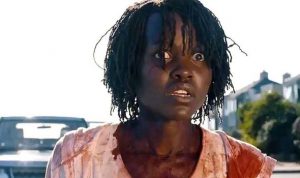Tropic Sprockets / Us
By Ian Brockway
Jordan Peele’s follow up to the provocative debut “Get Out,” entitled “Us,” is vivid and striking, if a bit conventional once the theme is revealed. The new film is satisfyingly eerie with an almost wistful fright that builds. The subtle tones during the initial scenes owe much to both “The Twilight Zone” and Stanley Kubrick.
Gabe (Winston Duke) and Adelaide (Lupita Nyong’o) are taking their two kids to an exclusive beach cottage in Santa Cruz. On the first night, a family appears in Gabe’s driveway and they don’t leave.
The eerie family are “doubles” of Gabe’s own. Armed with deadly scissors, they hold the family captive and then force them to run. Mostly nonverbal (excluding Red) they intimidate by brute force.
Most compelling is Lupita Nyong’o who plays two parts, Adelaide and Red, an acrobatic twin with a scorched voice box and carnage on her mind.
Adelaide has PTSD due to being lost as a child and she has a yearning to comprehend her malevolent double. But her understanding only goes so far.
Each family member fights for life.
Though the film loses a bit of its thrill midway (when there is a substantial reveal) Adelaide’s struggle is suspenseful and impacting.
There are several cinematic references. The frightened faces recall “The Shining,” while camera pans of the beach are reminiscent of “Jaws.” The theme music taken from Luniz’s “I Got 5 On It,” has a background melody similar to The Exorcist’s Tubular Bells. There is even a clustering flock of seagulls right out of Hitchcock. There is one dance sequence similar to “Suspiria,” while the doubles’ jumpsuits are akin to the red jackets of Michael Jackson’s Thriller.
There are many interpretations as to why “the untethered” (the doppelgangers) are tormenting the family. Karmic revenge against the suburban status quo? Government conspiracy?
Whatever the cause, Jordan Peele has done another creepy horror film with visual potency and some scare power. The last image of a sprawling countryside peppered with red men and women like flowering poppies is both disquieting and poetic, just maybe pointing to a political wave or a nationwide mental collapse. In “Us” as in the previous “Get Out” whatever is nonverbal and unexplained becomes the most terrifying.
Write Ian at [email protected]
[livemarket market_name="KONK Life LiveMarket" limit=3 category=“” show_signup=0 show_more=0]






No Comment